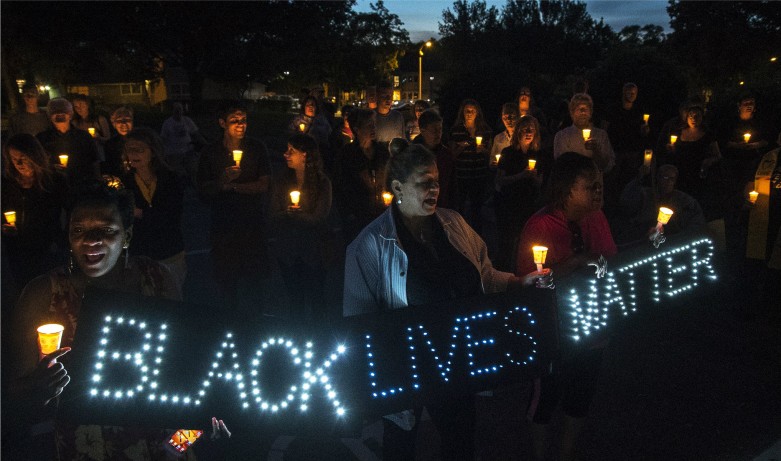
We Stand with #BlackLivesMatter
Black Lives Matter.
I want to be clear about where Free Press stands.
Black Lives Matter.
I want to be clear about whom Free Press supports.
Black Lives Matter.
Just a few days ago, Free Press sent out an action alert highlighting the outrageous charges filed in St. Louis County against journalists Wesley Lowery and Ryan J. Reilly, who were roughed up and arrested while covering the protests in Ferguson last year after the killing of Michael Brown. A Canadian journalist also faces charges.
This crackdown goes beyond traditional reporters: Several prominent Black Lives Matter activists were arrested on Monday while attempting to film protests in St. Louis. Without many of these same people, via their videos, live-streams and tweets, we wouldn’t know what’s been happening in Ferguson. As we wrote: “We need journalists — and anyone performing acts of journalism — to act as our eyes and ears on the ground, protect our communities’ best interests and report on any abuses of power.”
More than 10,000 people signed our petition within the first 24 hours, and we’re beginning to coordinate with a variety of press freedom groups to pressure officials in St. Louis to drop the charges against all the journalists.
At the same time, our inbox has been filled with racist messages, attacks on Black activists and the community in Ferguson, and bizarre blame-the-victim claims about what’s happening there.
These emails aren’t just coming from Internet trolls; they’re coming from some Free Press members, too. I know these messages are nothing compared to what Black Lives Matter activists and movement leaders have to deal with daily. But it’s wrong and needs to be called out.
If this is you, stop following us. Free Press isn’t for you. We support the activists putting themselves on the line to respond to this emergency and build this historic movement.
Others may ask: What does this have to do with media and technology?
The answer? Everything.
The ability to speak freely and tell your own stories is critical to the struggle for racial justice. (For the longer historical answer, see my colleague Joseph Torres’ recent essay on race and the media.) But know that every issue Free Press works on — Net Neutrality, media ownership, the future of journalism, even spectrum policy — intersects with the legacy and the reality of structural racism.
To create a better media system and a more just society, the pursuit of racial equity must be a top priority. But we must also unequivocally show that we stand with the Movement for Black Lives. And that’s about more than saying “Black Lives Matter.”
Through the years, Free Press has built close relationships with groups like the Center for Media Justice, ColorOfChange.org and the National Hispanic Media Coalition. But we can and must do better to devote more of our organization’s energy and resources as accomplices in the fight for racial justice.
Our allies at Democracy for America articulated this responsibility in their reaction to the Black Lives Matter protest at Netroots Nation in July: “Real solidarity means not just taking action in response to racial injustice and police brutality, but doing everything we can to connect the fight against structural racism and our country’s culture of white supremacy to every aspect of the work we do.”
That’s what we intend to do at Free Press.
At the starting point, we will listen, listen and listen some more. We’ll make mistakes. We’ll learn from them. And as a white-led organization, we also have a responsibility to watch what we’re doing in activist spaces — that we’re showing up, asking how we can help, and not redirecting the spotlight away from those on the frontlines of this fight.
One of the most important things we can do is talk to our white allies, peers and members about dismantling structural racism and confronting white supremacy. And that’s what prompted me to write this post.
Some of you out there are uncomfortable with the tactics being used by the Movement for Black Lives. You’re uncomfortable with the talk of white supremacy. You’re uncomfortable with activists interrupting presidential candidates. But change — real change — doesn’t happen when we focus on keeping people comfortable.
They say a journalist’s job is to comfort the afflicted and afflict the comfortable — and I think that’s a media activist’s charge, too. That’s why I’m at Free Press, and I hope that’s why you’ll support us, join our campaigns and hold us accountable.
And that’s why we stand with Black Lives Matter, and why you should too.
Original photo by Flickr user Light Brigading